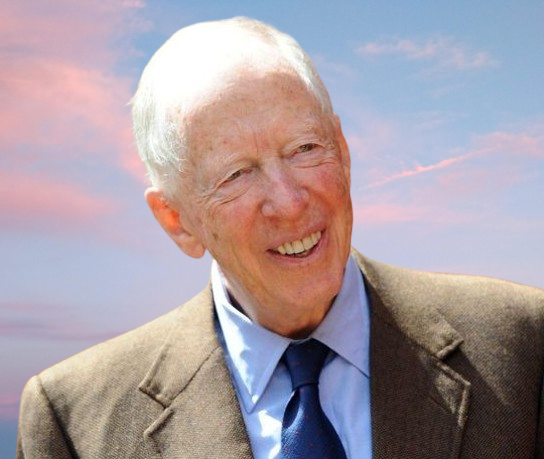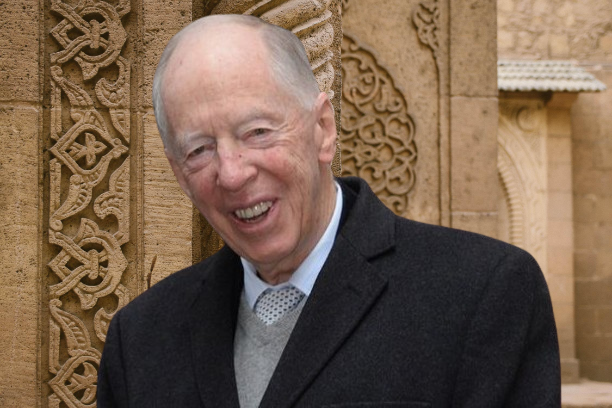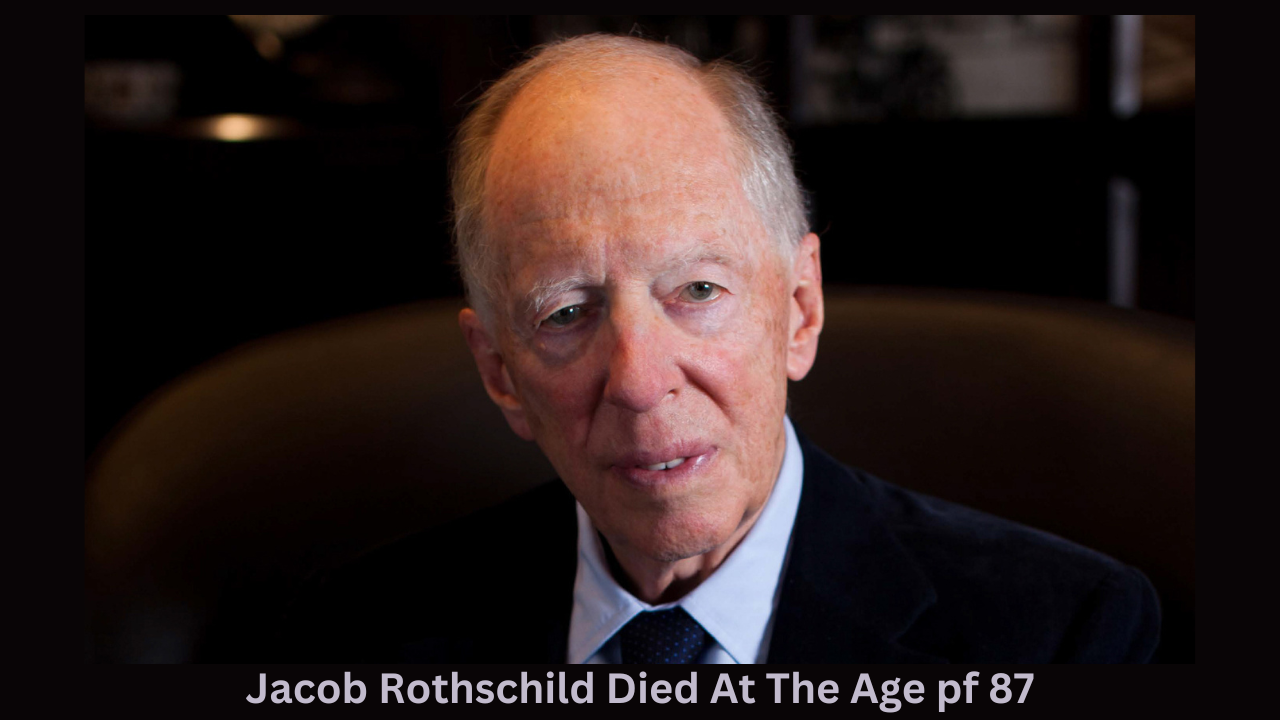Jacob Rothschild, a financier who was rich, loved art and friendly to people with connections to Israel, has died at 87 years old; this is an important moment for the world of high finance as at a crucial time in its evolution he walked out on his family’s banking dynasty.
Announcement and Mystery Surrounding His Death
The British charity organization that Jacob Rothschild chaired announced his death. However, the place and timing of his passing were not made known making it remain mysterious.
The Journey of Mr. Rothschild – Breaking Family Ties for a New Path

At one point known as Fourth Baron Rothschild, Mr.Rothschild was related to Mayer Amschel Rothschild, a Jewish merchant operating from Frankfurt ghetto. In the late 18th century through early 19th, four of his sons departed from the banking dynasty and went to Vienna, London, Naples and Paris with hopes building the families’ fortunes there.
As noted by an article in the London Review of Books by American scholar, Jonathan Steinberg in 1999, the House of Rothschild was the largest bank globally for most part of the 19th century. In Steinberg’s view, Nathan Mayer Rothschild had good luck like Bill Gates has today.
The Multi-Faceted Jacob Rothschild
Jacob Rothschild, who is often seen in his trademarked charcoal gray sweater with a rolled neckline over a blue shirt and a patterned tie, is well known for his unassuming manner. He was frequently seen near his London residence on Church Wall while wearing blue jacket.
In 2016, Jacob Rothschild had some involvement in Israel behind-the-scenes during his career as a successful financier. He was described as being philanthropist, lover of art and humanity’s friend.
The Legacy of the Rothschild Dynasty
The wealth accumulation by Rothchilds family cannot be separated from their involvement into Napoleonic Wars especially their financing towards British army. However, beyond financial matters the family enhanced familial ties and made its legacy watery or as described by Mr. Steinberg “the most powerful individual in European society of his time.”
Jacob Rothschild’s Career and the Changing Face of Finance
Jacob Rothschild entered his family’s financial dynasty when he joined N.M. Rothschild & Sons Bank in London in 1963. Eton College and Christ Church, Oxford educated him before joining one of the most conservative institutions in the world during a period when the landscape was changing with that unregulated ‘Big Bang’ of 1986.
As British merchant banks on Wall Street continued to gain financial strength, exerting pressure for different directions, Mr. Rothschild favored merging the London office of the family’s financial empire with S.G. Warburgs. However, his cousin Evelyn de Rothschild together with Victor who had worked at MI5 were against the idea.
Although Jacob Rothschild has made a huge impact on global finance scene, his departure raises doubts about where the Rothschilds go from here.
The Decision to Separate
Mr. Rothschild decided to separate. In 1965, Mr. Rothschild declared: “We must aim to make ourselves as much a brain bank as a money bank.”
Challenging The Culture Of Family Control And Secrecy
At one and same time also he was challenging himself against the culture of family control and secrecy which had been kept apart from each other since he came into existence.
Women’s Inheritance and Breaking of Traditions
According to Steinberg, Family Palais had excluded daughters and all sons-in-law from any share in the business. Every founder gave up “rights to audit his wife’s books of account and took an oath that just direct male progenies would inherit shares”.
Rothschilds’ Marriages beyond Religious Boundaries
Intermarriage outside Rothschilds’ Jewish customs was discouraged. This family had secretive weddings. “Less than fifteen out of twenty-one marriages between Mayor Amschel’s descendants took place from 1824 to 1877,” noted Steinberg.
Values Conflict in the 1960s

By the early 1960s, family rules were relaxed leading to a rift with Mr. Rothschild’s SG Warburg. Such priorities as ‘preservation of family control” held by Victor and Evelyn de Rothschild (Britain) according to Neil Ferguson in his book “The House of Rothschild” (1998), where he analyzed this family more fully than anyone else has done before him. According to Mr Ferguson this struggle was “a grave schism within the British wing of the clan”.
Only in 1980, after bitter rivals decided that the family bank, N.M. Rothschild & Sons Ltd., would function independently of Mr. Rothschild’s deceased company, J. Rothschild & Company, and that the latter’s assets would be known by their original names, Rothschild Investment Trust, did the conflict come to an end.
Rothschild’s Career and Wealth
In 2019, Mr. Rothschild stepped down as RIT Capital Partners’ CEO. His personal wealth was estimated to be more than $1 billion by Bloomberg’s Billionaires Index that year.
Childhood and Schooling
On April 29, 1936, in Buckinghamshire, England, the third Baron Rothschild and his first wife, Barbara Judith Hutchinson Rothschild, welcomed Nathaniel Charles Jacob Rothschild into the world. Prior to entering the family bank, he attended Oxford to study history.
Variety of Projects and Failed Submissions
Following his resignation as president of RIT, he worked on a number of ventures, including a failed 1989 attempt to acquire British American Tobacco for a reported $21 billion.
Global Participations
He maintained a vast network of international ties while serving as Prince Charles’ advisor and Deputy Chairman of Rupert Murdoch’s BSkyB channel. He was a member of the Blackstone Group’s International Advisory Board and co-founded the asset management firm J. Rothschild Assurance Group, which is currently known as St. James’s Place, in 1991.
Disputes and Unconfirmed Reports
The career of Rothschild was not spared controversy. According to allegations from 2003, he worked out a deal with Putin’s rival, Russian businessman Mikhail Khodorkovsky, to give Rothschild Khodorkovsky’s interests in Yukos Oil Company in order to avoid being arrested. Mr. Rothschild declined to vouch for these claims.
Israel’s Role and Fundraising
Apart from his influential financial position, Mr. Rothschild was a low-key player in Israel, supervising farming initiatives under the Yad Hanadiv Foundation.
Casual Projects and Silent Sponsorship
Over many years, the Rothschilds quietly funded important initiatives without tying their name to them, such as the building of Israel’s National Library, Supreme Court, and Parliament. Mr. Rothschild said, “We have tried to remain in the shadows,” in an interview with the Jerusalem Report in 2012. “Our tradition has been not to shout from the rooftops about what we are doing.”
An Evaluation of the Financial System
Rothschild publicly chastised his fellow financiers in the world aristocracy for many years. As said by him to the Jerusalem Report in 2012, four years following the 2008 financial crisis, “I have great sympathy with those who have protested against some of the excesses in the financial world.”
He continued, “Eventually, these are position that have been very fortunate, which are a result of a framework filled by numerous advantages but which, throughout, has had an adverse impact in different places worldwide.”





